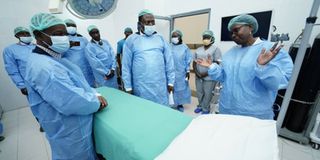Surgeons advise govt on improving surgical services

The Minister of Health, Dr Ruth Aceng (right), tours Kyabirwa Surgical Centre in Kyabirwa Village, North Division, Jinja City, on September 1, 2023. PHOTO/PHILIP WAFULA
What you need to know:
- We still have a high rate of non-communicable diseases, particularly cardiovascular diseases and we also still have a fixed rate of congenital heart disease,’’ Dr Tom Mwambu, a senior Consultant Surgeon at the Uganda Heart Institute.
Surgeons in Uganda have asked the government to expedite establishment of National Health Insurance Scheme, increase the number of surgeons in public service and improve health infrastructure to address gaps in access to surgical services.
The 2017 report of a study conducted in 2,315 households in the country by Tu Tran and colleagues in Uganda, showed that limited access to surgical services was associated with up to “34 percent” of deaths among patients in need of the services.
Dr Moses Galukande, the president-elect of the Association of Surgeons of Uganda (ASOU) who also participated in the above study, said they found that “only two out of ten Ugandans” who need surgical services can “access safe surgery”.
“That is a bit scary. In 2,315 households we surveyed, 4,248 individuals: 461 (10.6 percent) reported 1 or more conditions requiring at least surgical consultation. That means around 10 percent of Ugandans need surgical services ,” he said.
“The most frequent barrier to surgical care was the lack of financial resources for the direct cost of care,” he added.
Dr Galukande was speaking on Tuesday during the Surgical Landscape Exhibition in Kololo, Kampala.
Dr Tom Mwambu, a senior Consultant Surgeon at the Uganda Heart Institute, said besides increasing prevention efforts, there is a need to ensure Ugandans can access the services.
“We still have a high rate of non-communicable diseases, particularly cardiovascular diseases and we also still have a fixed rate of congenital heart disease. If you have one percent rate of congenital heart disease in your country, [as it is the case in Uganda], if you have 30 million population today and 40 million tomorrow, just know that the numbers will increase yet the service is very expensive,” he said.
“Parliamentarians, help us get the [National] Health Insurance [Scheme] (NHIS)running because there is no other way even a poor public servant is going to afford these services,” he said.
Dr Peter Kibuuka, the chief executive officer of Kampala Hospital, said once the NHIS is in place, private hospitals should be brought on board to offer services because many have invested in modern equipment and developed capacity to handle complex cases.
Prof Frank Asiimwe, the outgoing president of ASOU, appealed to the government to increase opportunities for the training of specialists, have a clear deployment and retention strategy in public service, increase funding for the national health budget and expedite the establishment of NHIS.




